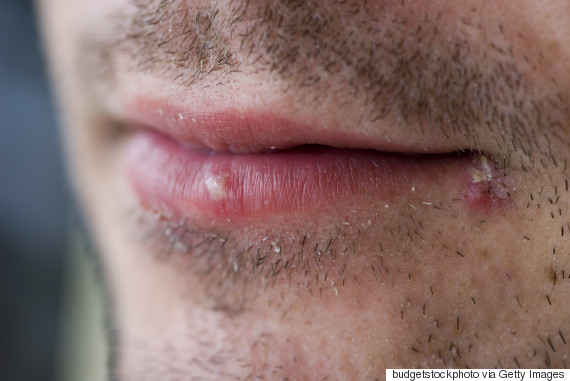Skin cancer is one of the most common cancers in the world, but scientists may have discovered an unusual treatment: the herpes virus.
A genetically-modified cold sore virus could be be made available as a game-changing new treatment for deadly skin cancer within a year, scientists claim.
Extraordinary results from a Phase III trial involving patients with aggressive, inoperable disease have shown that the therapy can eradicate tumours and halt their growth.
The unique treatment combines a direct targeted attack on cancer cells with an immunotherapy approach that primes the body’s own defences to combat the disease.

Of the 26% of patients who responded to the herpes virus treatment, known as T-Vec, one in 10 saw their tumours vanish without trace.
Another 16% of responding patients experienced a “partial remission” that reduced the size of their tumours by more than 50%.
Professor Kevin Harrington, from the Institute of Cancer Research in London, led the international Phase III trial conducted in the UK, US, Canada and South Africa.
He said: “It’s not an exaggeration to say this is a first-in-class agent, an entirely new type of anti-cancer treatment.
“There will have to be discussions about cost effectiveness but we hope to see this agent receive approval in about the next 12 months, making it possible to prescribe it for cancer.”
T-Vec is one of a new generation of virus-based drugs in development and the first to show real potential in a major Phase III trial, the last step before a new medicine is licensed and made available to patients.
It contains the same herpes simplex type-1 virus that causes cold sores, genetically engineered to make it harmless to patients but lethal to cancer.
The virus is unable to multiply in healthy skin cells but finds fertile ground for growth in tumour cells. Eventually the virus proliferates to such an extent that it literally explodes out of the cancer cells, destroying them.
At the same time, the GM virus produces a molecule called GM-CSF which acts as a potent immune system stimulator.
This has the effect of priming the immune system to recognise and attack tumour proteins left in the debris of the obliterated cancer cells.
Thereafter the immune system continues to target the same proteins when they are “flagged up” by returning cancer, providing protection against the disease.
How long the immunity lasts is not known, but some patients have remained in remission – either cancer free or experiencing no further tumour growth – for as long as three years.
Harrington said: “There is increasing excitement over the use of viral treatments like T-Vec for cancer, because they can launch a two-pronged attack on tumours – both killing cancer cells directly and marshalling the immune system against them.
“And because viral treatment can target cancer cells specifically, it tends to have fewer side-effects than traditional chemotherapy or some of the other new immunotherapies.”
Findings from the trial, funded by US biopharmaceutical company Amgen, which manufactures T-Vec, are reported in the Journal of Clinical Oncology.
A total of 436 patients with aggressive, inoperable malignant melanoma were recruited, of which 295 received injections of T-Vec.
The remaining “control” patients were not given the virus but treated with the immunotherapy molecule GM-CSF.
Overall, 26% of patients in the T-Vec arm and 6% of those in the control arm responded to treatment.
Of those responding to T-Vec, 16.3% showed a “durable response” lasting more than six months. This compared with 2.1% of patients responding to the control therapy.
Patients with earlier stage disease who were given T-Vec as their first treatment also experienced a significant survival benefit, living an average of 41 months.
This compared with a survival time of around 21.5 months for earlier-stage patients given GM-CSF.
EU drug regulator the European Medicines Agency is looking at the trial results and is expected to deliver its initial verdict on T-Vec later this year.
The Food and Drugs Administration (FDA) in the US issued a “favourable opinion” of the treatment in April.
Professor Paul Workman, chief executive of The Institute of Cancer Research, said: “We may normally think of viruses as the enemies of mankind, but it’s their very ability to specifically infect and kill human cells that can make them such promising cancer treatments.
“In this case we are harnessing the ability of an engineered virus to kill cancer cells and stimulate an immune response.
“It’s exciting to see the potential of viral treatment realised in a Phase III trial, and there is hope that therapies like this could be even more effective when combined with targeted cancer drugs to achieve long-term control and cure.”
Each year around 13,300 people in the UK are diagnosed with malignant melanoma and 2,148 people die from the disease, according to the latest official figures.
Gillian Nuttall, from the charity Melanoma UK, said: “This promising news will be greatly received by the melanoma community, patients and clinicians alike. Patients showing responses beyond three years is something that up until now, we could only have imagined.”
Scientists hope T-Vec may also show promise in the treatment of other cancers, notably head-and-neck cancers, pancreatic cancer, bladder cancer, lung cancer and liver cancer.
Currently T-Vec has to be injected into tumours, but in future it or other similar drugs may be adapted to be effective when carried around the body in the bloodstream.
Gene therapy expert Professor Leonard Seymour, from Oxford University, said: “This T-Vec study shows powerful stimulus of an anti-cancer immune response in patients with melanoma skin cancer.
“The next step will be to develop oncolytic virus vaccines that can be given intravenously to reach all metastatic tumour deposits, allowing the same vaccine effects in all tumour growths.
“At this stage it’s very promising that this appears to have positive results for melanoma skin cancer, but we need further research to see whether it could be relevant to other cancers too.”







